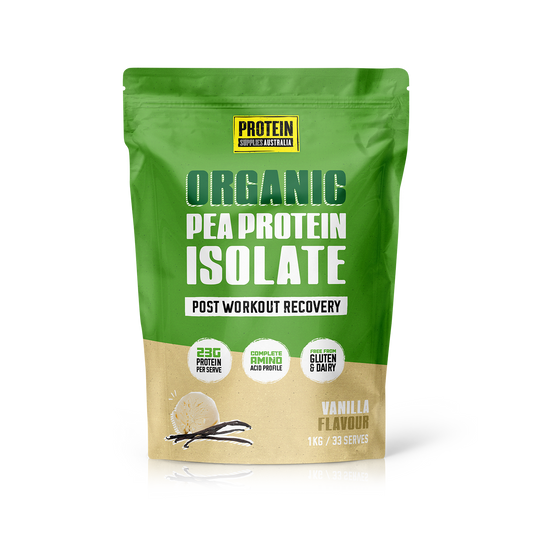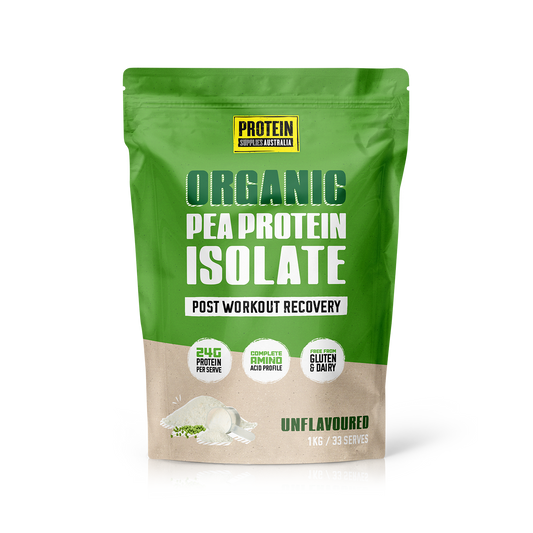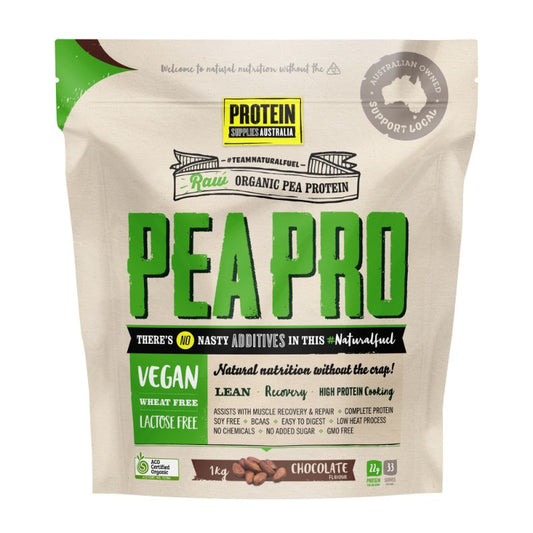-
 Sold out
Sold outPea Protein Vanilla
Vendor:Protein Supplies AustraliaRegular price From $26.36Regular priceUnit price per -
Pea Protein Pure
Vendor:Protein Supplies AustraliaRegular price From $26.36Regular priceUnit price per -
Pea Protein Chocolate
Vendor:Protein Supplies AustraliaRegular price From $26.36Regular priceUnit price per
FAQ Pea Protein
What is pea protein?
Pea protein is a high-quality, plant-based protein derived from yellow peas. It is a popular alternative to animal-based proteins and is known for its digestibility and amino acid profile.
How is pea protein different from other plant proteins?
Pea protein is hypoallergenic and easily digestible. It is free from common allergens like gluten and soy, making it suitable for a wide range of dietary needs.
What are the main components of pea protein?
Pea protein is rich in essential amino acids, particularly lysine, and contains significant amounts of branched-chain amino acids (BCAAs). It is also a good source of iron and other essential nutrients.
Is pea protein a complete protein?
While pea protein is not a complete protein on its own, it has a high lysine content and can be easily combined with other plant proteins, such as rice protein, to create a complete amino acid profile.
What are the benefits of taking pea protein?
Pea protein supports muscle growth and repair, aids in weight management, and promotes heart health. It is also easy to digest and suitable for those with food sensitivities.
How does pea protein support muscle growth?
Pea protein provides essential amino acids and BCAAs that are vital for muscle protein synthesis. It helps repair and build muscle tissues, making it beneficial for athletes and fitness enthusiasts.
Can pea protein help with weight loss?
Yes, pea protein can aid in weight loss by promoting satiety, reducing overall calorie intake, and preserving lean muscle mass, which boosts metabolism.
When is the best time to take pea protein?
Pea protein can be taken any time of day—post-workout for muscle recovery, between meals to curb hunger, or as a meal replacement for weight management.
How much pea protein should I take daily?
The typical dosage is 20-30 grams per serving. The exact amount depends on your protein needs, which vary based on age, weight, activity level, and fitness goals.
Is pea protein safe for everyone?
Pea protein is generally safe for most people, including those with allergies to dairy, gluten, and soy. However, individuals with specific allergies to legumes should exercise caution.
Are there any side effects of taking pea protein?
Pea protein is usually well-tolerated, but some people may experience mild digestive issues, such as bloating or gas. Starting with a smaller dose can help assess tolerance.
How does pea protein compare to whey protein?
Pea protein is a great alternative for those avoiding dairy, offering a similar protein content and muscle-building benefits. Whey protein digests faster, while pea protein is known for its ease of digestion and hypoallergenic properties.
Is pea protein suitable for vegetarians and vegans?
Yes, pea protein is an excellent choice for vegetarians and vegans as it is entirely plant-based.
Can people with gluten intolerance take pea protein?
Yes, pea protein is naturally gluten-free, making it suitable for those with gluten intolerance or celiac disease.
What should I look for when choosing a pea protein supplement?
Look for high-quality, non-GMO, and organic pea protein with minimal additives. Check for third-party testing to ensure purity and potency.
Can I mix pea protein with other supplements or foods?
Yes, pea protein can be mixed with water, milk alternatives, smoothies, or incorporated into recipes like pancakes, muffins, and baked goods.
Can pea protein replace meals?
Pea protein can be used as a meal replacement if combined with other nutrient-dense foods like fruits, vegetables, and healthy fats to ensure a balanced intake.
Why choose pea protein over other protein supplements?
Pea protein is ideal for those looking for a sustainable, hypoallergenic, and easily digestible protein source. It supports muscle growth, aids in weight management, and is suitable for various dietary needs, making it a versatile and beneficial supplement.



